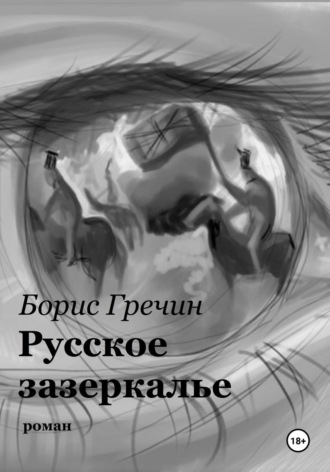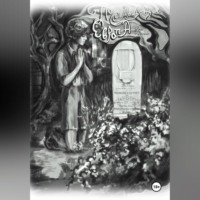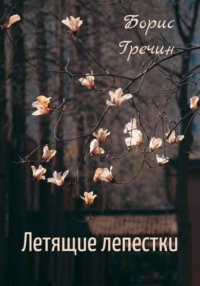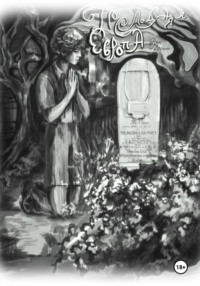
Полная версия
Русское зазеркалье
Да вот же и «Канцелярiя»: тёмно-зелёный четырёхэтажный дом и табличка у входа!
С большим трудом я поднялась на последний этаж по узкой, плохо освещённой, грязной лестнице, выкрашенной до уровня плеча в болотный цвет. На площадке второго этажа дверь была полуоткрыта, а запахи отчётливо намекали, что за этой дверью кто-то умер – и тело убирать никто не торопится. Ноги болели не как во сне, а совершенно по-настоящему. Сон ли это вообще, и если сон, то что за бесконечный кошмар? Дверь на последнем этаже хоть и не имела таблички, но выглядела по-казённому. Навалившись на неё всем телом, я вошла в контору: длинный ряд из четырёх соединённых помещений, прокуренных, тесных и битком-набитых другими посетителями. Человек сто стояло в общей очереди, не меньше. Около дюжины, правда, сидели на колченогих табуретах и сияли от счастья по поводу того, что им не приходится стоять.
Я пристроилась в конец очереди, пошатываясь от духоты и усталости. Очередь еле двигалась; покойники в ней, впрочем, не унывали, а жили своей насыщенной жизнью, спорили, торговались, осуждали отсутствующих, травили байки и небылицы. До меня долетали обрывки разговоров разных людей, которые сливались в одно тягомотное заунывье.
– …«За борьбу с тиранией» в мирное время не дают, это ты, положим, врёшь. Это вообще одна из высших наград, так что не надо тут… А вот на «Друга демократии» у тебя есть шансы. Но придётся, конечно, документы собрать. А ты как думал? Если хочешь в жизни чего добиться – крутиться надо. Тридцать семь позиций. Могу по памяти сказать: интересует? Записывать будешь? Если до конца месяца успеешь – везуха, а в новом месяце новые требования будут, это как пить дать, парень… Говоришь, засомневался нужно ли это вообще? Нет, ты дурак или как? Ты, вообще, в курсе, что право на собственную недвижимость получают только имеющие награды лица? Одна медаль – один квадратный метр. У кого две медали, тому, соответственно, два квадратных метра. Правда, ради двух медалей надо вообще в лепёшку расшибиться… Ну да, это всё будет из дерева, проще говоря, сарай. Да, он сгниёт через десять лет: сам знаешь, климат. Но сам факт, сам статус! Ты много здесь видал людей, у кого есть собственная недвижимость, а не койко-место? А? Вот, то-то же!
– …Женщина, не трогайте меня руками, я тоже могу тронуть! Если будете орать, я вам откушу ухо! Что значит «При чём здесь логика» – я не про логику, я вам ухо откушу!
– …Через Неелово я тебе не советую ехать. Там гиблый край, стаи навальнят, набрасываются на человека – и всё, нету человека. Через Неурожайку картина примерно та же. Через Горелово тоже не советую: там руины какого-то храма – очень опасно, очень! Чем опасно? А излучение как же? Нет, я сам не бывал! Люди говорят…
– …Амалия, конечно, чумичка. Но и Катерина тоже, если разобраться, немногим лучше. «В ноги царю, в ноги царю!» – всё, замарала себя навеки. Кто после этого её рукопожмёт? Какое там рукопожмёт! Да с ней после этого никто в поле срать не сядеть! Только разве Алексей Анатольевич, да и то по великой милости…
– …Любовь к этой стране – это бацилла. Она заражает, и уже не вылечишься. Ещё любовь к этой стране – это раненый зверь, вроде лисы. Выглядит умилительно, но зверь – дикий, хищник, убийца. Ты его пожалеешь, спрячешь за пазуху – а он тебе выест внутренности. Вот так он и проповедовал. Великого ума был человек! Кому сейчас интересны великие люди? Измельчали мы все, выдохлись, скукожились…
– …И бросили мужика в Овраг. Всё, без шансов. А там уже пропал человек. Что там ниже, спрашиваешь? Ну, по последним сведениям, сразу попадаешь в Хылайт. Это от английского hell lite26 – английского не учил, что ли, деревня? А в Хылайте, понимаешь, не живут. Там умирают каждую секунду. То птица-мозгоклюйка тебе мозг выклюет, то разрубят тебя напополам, то, понимаешь, залюбят тебя до смерти инструментом самодержавия. Разнообразно у них там всё, с фантазией. Говорят, правда, что если есть бабосы, ты и там нормально устроишься. Но, думаю, порожняк гонят: какие бабосы, там же всё меняется каждую секунду. Вот держишь ты в руке, допустим, яблоко. Яблоко помнишь как выглядит, нет? Так, ладно: вот держишь ты, например, пайку двухсотграммовую. И здесь, у нас, ты её просто держишь. А там, в Хылайте, она сейчас пайка, а через пять секунд червяк, а через пять секунд этот червяк тебе полруки отъел. Вот так-то вот, парниша, вот такая бывает жизнь…
– А я вот другое слышал: те, кому везёт, вместо Хылайта падают на Малахов курган. Это вот, значит, как: попадаешь ты в бастион, где под открытым небом идёт шоу «Малахов плюс Малахов». Всё время, двадцать четыре часа в сутки. Скажешь, можно и потерпеть? Да чёрта с два! Потому что Малахов курган – это Севастополь, а Севастополь – это Крым, а Крым не наш, как известно любому приличному человеку. В общем, раз в неделю, что ли, доходит гиря до полу, чаша терпения цивилизованных народов переполняется, и на Малахова со стены падает статуя капитана Михаила Малахова. Натурально, насмерть. Потому и называется «Малахов плюс Малахов». А это и есть сигнал: как статуя упала, подходят английские военные корабли и лупят по бастиону прямой наводкой. Старожилы, кто знают, заранее под скамью лезут. Хотя шансов выжить всё равно немного. После бомбёжки оживляют только самого Малахова, у него безлимит, а остальные вертись как хочешь. Есть, правда, которые и до шести раундов выживают. А что потóм? А потом вэлкам ту Хылайт, само собой…
Я не могу это больше слушать, поняла я. Люди, вы ведь уже умерли, а продолжаете вращаться в этом лютом «круге первом» собственноручно, по кирпичику, сложенного вами самими чистилища! Ещё час в этой канцелярии, и я застряну здесь на тысячу лет. Или просто умру, и меня выбросят в Овраг, и welcome to Hellite,27 как говорится…
Собрав все силы в кулак, я оттолкнулась от стены и двинулась вдоль очереди. Очередь недовольно зароптала.
– Sorry, I have it urgent,28 – сухо сказала я вслух. Очередь примолкла. Я между тем добралась до самого её конца, до крохотного окошка в стене, к которому склонялась очередная посетительница. Ею оказалась моя недавняя попутчица, старушка с рыжими кудрями (когда успела?): ненатурально всхлипывая, она бормотала:
– Ну войдите же в положение… ну мне же положен рыбий жир как жертве режима…
Мягко взяв жертву режима за плечи, я отодвинула её от окошка и склонилась к нему сама. Выдохнула:
– Мне нужна справка об Александре Михайловиче Азурове.
– Пребывание Азурова в нашем мире не зарегистрировано! – гаркнули мне из окошка: голос был подозрительно похож на голос чёрта из табакерки. Или у всех чертей схожие голоса? Лапа чиновника, которую я сумела рассмотреть в окошке, была в короткой бурой шерсти. – Женщина, проходите, не задерживайте очередь!
Я отошла от окна справки с пульсирующими висками. Опустилась на засаленный трёхногий табурет. Если я сейчас упаду здесь в обморок, то назад уже не вернусь. Ну же, миленькая, доставай зеркальце…
Размотав осколок зеркальца, я осознала, что забыла все инструкции Змеи, что вообще мало что понимаю, – и тогда, подражая какому-то индийскому аскету, из последних сил воткнула этот осколок в точку между бровей.
Тут же от острой боли я повалилась с колченогого табурета и, пролетая пустое пространство, с облегчением сообразила, что возвращаюсь в свою квартирку на 247 Eversholt street, в старую добрую Англию, такую предсказуемую, такую земную, такую непохожую на это жуткое русское зазеркалье.
Глава 2
[Сноска через несколько страниц.]
Dear students, glad to see you again. Today’s talk will be devoted to the bard movement, and to Alexander Rosenbaum’s ‘Foretelling My Destiny’ in particular.
You definitely know that in medieval British culture, a bard was a professional story teller, verse-maker, music composer, and maybe even an oral historian and genealogist, employed by a patron (such as a monarch or noble), to commemorate one or more of the patron’s ancestors and to praise the patron’s own activities. In simpler terms, a bard was a professional poet and singer whose occupation was to compose and sing verses in honour of the heroic achievements of princes and brave men. This initial reading of the term shouldn’t stop us from seeing some bards as minstrels who were medieval European entertainers. From the sixteenth century onwards, this latter term came to mean a specialist entertainer who sang songs and played musical instruments.
In English, we also use the term to talk about outstanding poets, such as Shakespeare who is known as the bard of Avon. We also might want to very occasionally use this term in order to describe a songwriter who performs his own songs. Yesterday, I came across a question on funtrivia.com that asked, ‘Are there bards today?’ The answer was, ‘Absolutely, though we go by different job titles nowadays mostly. Today we're referred to as “singer-songwriters” or “composer-lyricists” or by some other coupling of terms for musicians who are at home in many areas of creation and performance of songs. Probably the best known living bard is Paul McCartney.’
The last statement is arguable, of course, as your humble lecturer happens to think that the cultural importance of Sir Paul McCartney’s legacy is greatly overestimated. I used to live in Liverpool for almost three years, so I have my rights to say that. What I wanted to say is that our wish to apply the term to singer-songwriters is perfectly justifiable. I guess, though, that in Britain, unlike in the Soviet Union, you would only describe a music performer as a bard if you wanted to emphasise his or her outstanding poetic achievements, so you would only use the term as a ‘title of honour’ of some sort, or probably as an attempt at flattery. I believe this rare use of the term in Western countries has something to do with its origin. A bard, in the initial reading of this word, is a musician who praises victories of heroes, an official propagandist, in terms of today. A minstrel, on the other hand, originally was simply a wandering entertainer, not only a singer, but also a juggler, an acrobat, or a fool. Even though the word ‘fool’ has a specific meaning in this context which disallows us to mistake minstrels for ordinary fools, I do doubt that any of the successful song performers of today would want to enjoy the doubtful pleasure of being called either a propagandist or a fool for Christ.
In Russia, the term has gained a much wider linguistic acceptance. No wonder, considering that no Soviet musician would be overly offended if you called him or her a propagandist which was a noble occupation or, in any case, which was what any ‘cultural worker’ in Soviet Russia was supposed to do. Russian culture also has a very special attitude to fools that originates from the period of the Tsardom of Muscovy when wandering monks and ascetics posed themselves as buffoons, maybe in order to freely expose the injustices committed by authorities and the rich men. Those ‘fools’ (the Russian word is yurodivy) were often seen as truly saint men. You might remember from the first lecture I gave that Boris Godunov, the first democratic tsar of Russia elected as a tsar in the meeting of the national assembly in 1598, humbly implores Bazil the fool to pray for the salvation of his soul. (Yes, we used to elect our national leaders even then: we have a tradition of democracy not many countries can be proud of. No, Boris Godunov was not a fictional character, and neither was Bazil the fool, although I don’t know whether this conversation has actually taken place.) A Soviet ‘creative worker’ or even an amateur musician was a propagandist whichever way you take it: either he or she was a bard admiring the war heroes and perhaps even propagating Communism, or he or she was a minstrel, a buffoon, a dissident cursing the social order, but never a simple entertainer.
I hope that you had time to look at the article on bards in the Soviet Union I have forwarded to you for your general knowledge. Allow me to summarise it and say that the term bard came to be used in the Soviet Union in the early 1960s and continues to be used in Russia today, to refer to singer-songwriters who wrote songs outside the Soviet establishment. Because in bard music songwriters perform their own songs, the genre is also commonly referred to as author song, or avtorskaya pesnya.
Bard poetry differs from other poetry mainly in being sung with simple guitar accompaniment as opposed to being spoken. Another difference is that it focuses less on style and more on meaning. The same I guess largely applies to Russian literature in general. ‘The substance of life doesn’t change much from one culture to another, but the human soul requires a beautiful wrapper,’ to quote from the Sacred Book of the Werewolf by Viktor Pelevin, a prominent contemporary Russian writer, translated into English by Andrew Bromfield. ‘Russian culture, though, fails to provide one, and it calls this state of affairs spirituality.’ In the second part of our lesson we probably discuss how you interpret this quotation and whether you agree with what Victor Pelevin says or not.
The most famous bard in the Soviet Union was perhaps Vladimir Vysotsky. Other well-known bards were Alexander Galich, Bulat Okudzhava, Yuri Vizbor, and Alexander Rosenbaum. The five named persons might be—well, arguably so, of course—the most essential contributors to the development of the bard movement in Russia. The article on Wikipedia that I have forwarded to you yesterday gives a lot of other names, referring you to many fierce critics of the Soviet regime and/or Russia after 1991—such as Evgeny Kliachkin, for instance. ‘Fierce critics’ is perhaps too strong an expression where such definitions as ‘moaners’ and ‘complainers’ would perfectly do. You see, to be a critic of the regime is one thing, whereas to have real impact on the audience is quite another.
Of the five artists I have named before, only Alexander Rosenbaum is still alive. Rosenbaum was born in 1951 in Saint Petersburg. You might want to know that he was given the honorary title of People’s Artists of the Russian Federation in 2001 and that he also has other state awards, among them the Order of Honour. Rosenbaum is an accomplished guitarist and accompanies himself on either a six- or twelve-string acoustic guitar. The person is still active creatively. In the musical landscape of today, Rosenbaum is known as an interpreter of outlaw, or criminal, songs (Russian blatnaya pesnya). Now, try to cope with the fact that the performer of criminal songs was given significant state awards. Doesn’t it stupefy you? In the future, I intend to say a few words about prison culture in Russia and its impact on Russian lifestyle in general.
Allow me to say that I am not an admirer of either prison culture, or criminal songs, or Rosenbaum’s experimentising with the genre. Like many Russians, I still love him for his songs of the Soviet period, to one of which you may listen right now. The name of the song is Veshchaya Sud’ba, which is roughly translatable as ‘Foretelling My Destiny.’ It was composed in 1986.
I think you would agree with me if I said that Alexander Rosenbaum sounds very dynamic and pretty much impressive here, not like your uncle or grandpa sitting on a sofa with a guitar in his hands. I am saying that because so many Russian bards, being working professionals in a non-musical occupation, do sound like our uncles and granddads. Their failure to provide a beautiful wrapper for what is inside, to use Victor Pelevin’s phrase again, has never prevented their audience from paying attention to them. Why? We shall discuss this question in the second part of our lesson. Unlike those bards, Alexander Rosenbaum is a musical professional who earns his living by the songs he produces. All this having been said, let us turn to the lyrics of the song.
The song describes a man—probably the author himself—who got lost while wandering no-one knows where. This unknown place is vaguely referred to as a field where you cannot see much because of white smoke spreading around. Maybe—probably even—it is fog, not smoke, because no fire is mentioned. There is a river there, and the water is cold. There is snow or, at least, there are snowflakes in the air. You might be able to explain to me how these snowflakes can coexist with fog: to me, it seems to contradict the laws of physics. While being in this remote place the protagonist encounters a miraculous old man. The old man, barefoot and in dirty rags, is not harmful or dangerous in any way; in fact, he doesn’t pay any attention to our hero at all, he just keeps walking across the river. The problem is that the river is not frozen over, and the author specifically mentions the fact that the old man walks on water as if it were solid ground. Another strange thing about the old man is that the snowflakes which land on his body do not melt, as if the old man were dead, but not dead as a ghost, because the snowflakes do not stick to ghosts, as you probably now. Having crossed the river, the old man goes on walking—or maybe descending into the ground. It begins to sound as a regular horror-movie, doesn’t it?
The author is wandering whether it is his own fate, or destiny, walking there across the river, and feels like asking—but no, he cannot ask anything, because his lips suddenly go numb.
Then the old man turns around, and the author gets goosebumps, because the person is obviously sleeping—or maybe he is not sleeping, since he is said to stare at our hero and to sleep at the same time. Another combination of two factors excluding each other, as fog and snowflakes, and that also reminds me of Eyes Wide Shut, a 1999 erotic mystery psychological drama film directed by Stanley Kubrick. Does this ‘sleeping’ refer to his shut eyes or does it mean that he is asleep ‘spiritually’? I do not know, although I have my ideas about it. ‘Who are you, old man?’ the hero of the song shouts at him. The old man utters a guffaw without answering the question and disappears.
‘I wouldn’t believe my eyes,’ the author further says, ‘I would regard everything as the product of my imagination, but then…’ But then, in some years, he sees the old man again—in the mirror. His black hair has turned grey, so now he can recongise himself as the old man he has encountered before in that strange place.
This is, put in simple words, what the lyrics of the song are about. You can notice a characteristic feature of medieval bard songs that also comes to light here: it tells us a story rather than explores the author’s feelings or otherwise deals with subjective states of his or her mind. A very noir, almost psychedelic story as it is, it is still a narrative.
How much can we get from this story? This largely depends on us.
Those of you who have ever watched Dead Poets Society, a 1989 American drama film, might remember the famous ‘Understanding Poetry’ scene. Allow me to give its outline. Mr Keating, the brilliant non-conventional teacher of English, asks Neil, one of his students, to read aloud from the course textbook. Neil then starts to read. The chapter that he is reading is entitled ‘Understanding Poetry’ and written by Dr J. Evans Pritchard, Ph. D. Dr J. Evans Pritchard is in all probability a fictional character. I would like to cite at length what the boy is reading. Here it is.
To fully understand poetry, we must first be fluent with its meter, rhyme, and figures of speech, then ask two questions: 1) How artfully has the objective of the poem been rendered and 2) How important is that objective? Question one rates the poem's perfection; question two rates its importance. And once these questions have been answered, determining the poem’s greatness becomes a relatively simple matter. If the poem's score for perfection is plotted on the horizontal of a graph and its importance is plotted on the vertical, then calculating the total area of the poem yields the measure of its greatness. A sonnet by Byron might score high on the vertical but only average on the horizontal. A Shakespearean sonnet, on the other hand, would score high both horizontally and vertically, yielding a massive total area, thereby revealing the poem to be truly great.
Mr Keating then calls the whole preface ‘excrement’ and encourages his class to tear this page out, to rip off the entire preface. In the dustbin with Dr Pritchard it goes.
To be sure, I admire Mr Keating’s being so energetic, so devoted to and so inspired by what he does, and I also like Robin Williams who plays him very much. I am not half as inspired as his character is. But I happen not to quite agree with Mr Keating on this particular point. Laughable as its attempts at geometric methods may be, this much-ridiculed and thoroughly discredited preface touches upon a very important problem, namely, that the importance of an artwork often is not up to its perfection, and vice versa. I only needed this very long digression from our subject to talk about the song of Alexander Rosenbaum which is in my humble opinion more artful than trying to really deliver to us an important message of some sort. It scores high on the horizontal but only average on the vertical, in terms of Dr Pritchard. At least, it was my first impression from it. What was yours? (A question for our discussion.) Be honest: doesn’t the song sound as a horror story? And if it is just a horror story, why should we engage ourselves in studies of Russian musical pulp fiction? To put it in other terms: can shocking and sensational fiction ever be seen as a true work of art? Why can it, or why cannot it, and what makes me ask you this question at all? Your thoughts on the subject will be most welcome in the second part of our lesson.
For now, Dostoyevsky comes to our rescue, as he often does, and answers my question positively, his novels being philosophical works of immense importance and shocking detective stories or, to put it more mildly, sensational page-turners at the same time. I am not saying that the song may ever rival with Dostoyevsky’s novels in their importance. And yet, it may contain more than just a horror story. Is it actually a horror story, and what makes you so easily agree with me when I say that it is? Let us explore this question before we deal with some meaningful details of the text.
Rosenbaum’s song is not a real horror story in the same way in which Dostoyevsky’s ‘gothic thrillers’ are not real detective stories. We know who has murdered the old pawnbroker at the very beginning of Crime and Punishment, so there is nothing for us to detect. Much in the same way, ‘Foretelling My Destiny’ imposes no real horror on us. (Or maybe it does—about which I will talk later on.) There is nothing here to be horrified by. No-one dies or is seriously injured here—it is just that a middle-aged man discovers that he has got some grey hair, that he, too, is getting older, that he, too, will die. This banality fails to provide a plot for a fascinating horror-movie, the only drama where it can exist being the sad drama of our life. I, too, have got some few grey hairs now which fact I suppose makes me less ‘marketable’ on the vanity fair of our life—by the way, the allegory of vanity fair goes back to Pilgrim's Progress by John Bunyan, an English writer and Puritan preacher who lived in the 17th century, not to W. M. Thackeray, as many falsely think.
Or perhaps getting old is a tragedy, after all. Imagine the most horrible situation that you can ever think of—a deadly pandemic, a nuclear bomb attack, or another such global disaster. Even then, each of us would die only once. Please try to fully grasp this very simple fact, namely, that even a world war, when seen strictly from a personal perspective, is not more painful than our own death from old age from which we absolutely cannot escape. In fact, such a planetary deadly disaster would probably be less painful for us than our death from old age, complicated through numerous illnesses when—allow me to quote from Sting’s 2014 musical The Last Ship—






